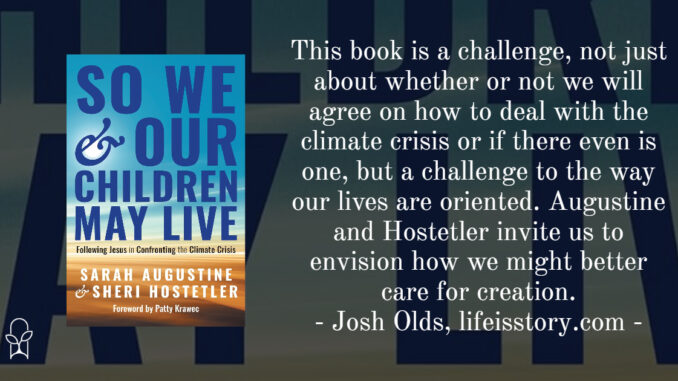
Also by this author: The Land Is Not Empty: Following Jesus in Dismantling the Doctrine of Discovery
Published by Herald Press on October 31, 2023
Genres: Ecological Justice, Non-Fiction
Buy on Amazon
Goodreads

Will we choose life for our children and the future of our planet?
Everywhere we look, we see signs that all is not right with our earth—extreme temperatures and weather patterns wreak havoc, pollutants sour soils and waterways, and fires and floods ravage land and communities. Climate change is just a symptom of a larger ecological crisis. If we want change, we must realize that the solutions to the problems we face can’t come through the same systems that created those problems in the first place.
Ecological justice requires that we challenge our assumptions about creation and our relationship to it. It requires decolonization. We must turn to the leadership of Indigenous communities who struggle for all life as land and water protectors, and must call on people of faith to join them.
?
This book offers hope for a better future alongside concrete actions for joining with Indigenous Peoples to protect life and negotiate with decision-makers for sustainable change that follows Jesus. In these pages, readers are called to confront climate change and choose life for our children and the future of our planet.
As I write this review, the United Nations Climate Change Conference is meeting in Dubai to discuss what action is necessary to curtail human influence on climate change. The news coming from the conference is both hopeful and sobering. Real change is possible. But real change will also mean really changing. And we’re on the brink of no return. Christians, you would think, would be at the forefront of climate care. After all, the very first job given to humanity by God is the care of creation. Unfortunately, eschatology, economics, and the quest for power has subverted that interpretation. Many Christians now believe that we were created to dominate over Creation—and that since God will destroy the world anyway, we are free to use it up to its fullest.
Shouting over that destructive message comes the passionate cries of Sarah Augustine and Sheri Hostetler in So We and Our Children May Live: Following Jesus in Confronting the Climate Crisis. The authors offer a unique perspective on the climate crisis, viewing it as a symptom of a larger ecological problem that demands a radical shift in our understanding of creation and our relationship to it. And in this, they are speaking not only to the climate change denying evangelicals but also the science-believers and climatologists at the UN Climate Change Conference—the solutions to our current ecological crisis cannot be found within the systems that created the problems in the first place.
Instead, Augustine and Hostetler argue for something radical in its simplicity: the necessity of decolonization and the imperativeness of listening to the leadership of Indigenous communities who live in harmony with the natural world. So We and Our Children May Live is the outgrowth of Augustine and Hostetler’s podcast Dismantling the Doctrine of Discovery, which in turn stemmed from Augustine’s book The Land is Not Empty. Augustine, a Pueblo (Tewa) descendent, has worked extensively with Indigenous people and been a voice for decolonization. Hostetler is a Mennonite of Amish descent, whose people are very close to nature.
If I’m to be completely honest, the message of So We and Our Children May Live isn’t exactly palatable. It difficult to swallow. It requires so much upending of the status quo and even exposes so-called “Green Growth” as being exploitative and unrealistic. The truth is that our current way of life is not sustainable on this earth. It simply isn’t. Augustine and Hostetler also point toward capitalism and the desire for wealth and power as contributing factors toward the problem. It’s a radical, passionate call for a different way of life, a different way of being.
This book is a challenge to us. Not just about whether or not we will agree that there is a climate crisis or even about how we will solve it, but a challenge to the way in which our lives are oriented. Are Augustine and Hostetler calling us back to an ancient way of life, where our technologies are laid down and we become one with the land? Can technology and nature coexist? The authors do not offer easy answers, but neither do they say it is impossible. Rather, they simply ask us to open our eyes and hearts toward what more we can do to enact sustainable change and become once again the caretakers of Creation to which God has entrusted us.
